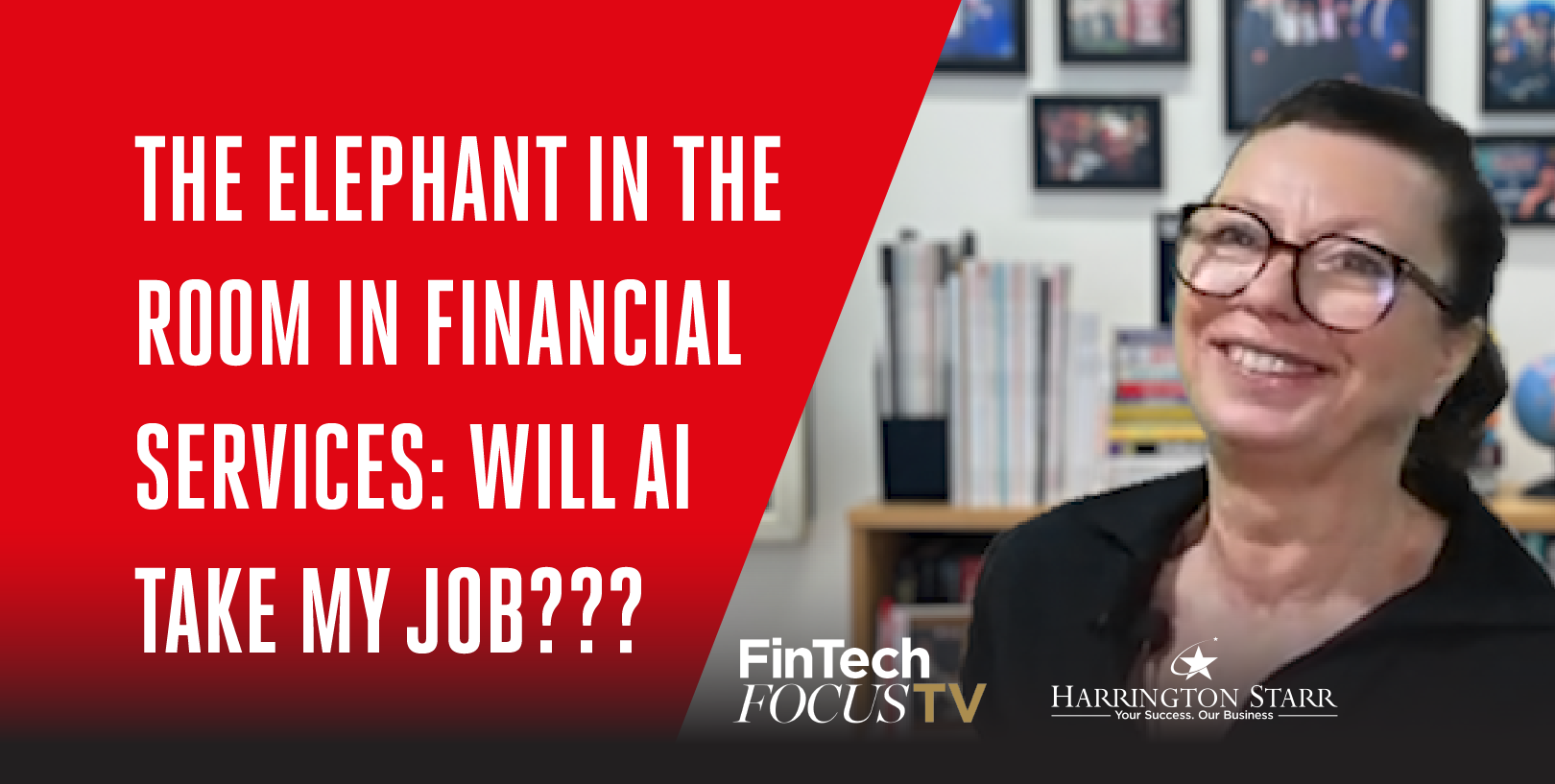In the latest episode of FinTech Focus TV, Toby welcomes back Rebecca Healey to discuss her report, "AI Beyond the Hyperbole," sponsored by Plato Partnership. The episode delves into how AI is impacting the financial services industry, the opportunities it presents, the challenges it poses, and what it means for the future workforce. This episode provides an in-depth examination of AI’s capabilities and its broader implications for the sector, shedding light on how businesses can adapt and thrive amidst rapid technological change.
The Genesis of "AI Beyond the Hyperbole"
Rebecca opens the discussion by sharing the origins of her report, which began 18 months ago. The process mirrored her earlier work on ESG, which initially faced similar scepticism before gaining mainstream traction. She began by consulting CTOs, heads of data, and heads of trading to explore whether and how firms were truly using AI. What she discovered was a mixture of interest, fear, and cautious optimism. Toby underscores this, noting how AI has quickly become central to conversations and strategies across the industry.
Is AI Taking Over Jobs? Addressing the Elephant in the Room
A core topic of the conversation is the concern that AI might displace jobs. Rebecca acknowledges this fear and contextualises it within the historical framework of other technological shifts. She draws an analogy to a 1950s housewife who might worry about losing her role to a washing machine. In reality, technology like AI is more about augmenting roles than replacing them outright. This perspective sets the stage for understanding AI as a tool that can transform jobs and create new opportunities.
Toby agrees, adding that the conversation around AI often carries an air of “protectionism,” with individuals concerned about their job security. He emphasises that the key is to see AI as a way to improve and augment roles, rather than eliminate them. This outlook is essential for professionals who want to stay relevant and leverage AI to enhance their work.
Understanding the Types of AI: Clarifying Misconceptions
Rebecca explains that a significant aspect of her report was differentiating between types of AI, which often get lumped together in conversations. She distinguishes between deterministic machine learning, which has been around since the 1960s, and generative AI, which has revolutionised modern workflows. The generative side of AI is particularly noteworthy due to three major factors: advanced computing power, the ability to run multiple API-based tasks concurrently, and the unique capability for text-to-action conversions.
These advancements mean that traditional, linear IT workflows are evolving into more dynamic, automated processes that empower end-users. As Toby and Rebecca discuss, this shift poses fundamental questions about how firms will adapt their workflows and decision-making processes.
The Evolution of AI: From Fear to Reality
Rebecca shares insights from her 18-month journey of writing the report, during which the perception of AI shifted significantly. Initially, there was widespread fear, followed by phases of scepticism and cautious optimism. By the time the report was completed, a clearer picture had emerged that balanced hope with realism. One of the main findings was that while AI could indeed revolutionise job roles, it would not do so without significant human oversight.
Toby points out that this journey reflects the evolution of any disruptive technology, drawing a parallel with electronic trading. When electronic trading first emerged, there was a similar wave of fear among traders that their jobs would become obsolete. However, what followed was an adaptation period during which new roles were created, and skill sets were transformed.
The Practical Uses of AI in Financial Services
Rebecca explains that while the theoretical potential of AI is immense, most firms are still exploring how to best incorporate it. The report found that AI has been most effective when used for specific purposes like enhancing Trade Cost Analysis (TCA) and improving pre-trade decision-making. However, the common thread across all applications is that AI serves as an augmentative tool rather than a complete replacement.
This augmentation aspect leads to a deeper conversation on the evolving nature of financial roles. Toby emphasises that while some fear AI’s impact on job security, history shows that new technologies often create new roles, like the emergence of prompt engineers today. Rebecca notes that these new positions will require a blend of technical skills and domain expertise, making adaptability more crucial than ever.
The Role of Data: The Lifeblood of AI
The discussion shifts to the critical role of data in making AI effective. Rebecca describes data as the new commodity, citing examples like Microsoft’s strategic investments in data-focused companies over traditional financial firms. For AI to be successful, firms need to ensure that they have high-quality, relevant data. As Toby and Rebecca agree, “garbage in, garbage out” is a principle that holds true for AI-driven systems. Good data leads to meaningful insights, whereas poor data can lead to flawed outcomes that may undermine an entire strategy.
Rebecca emphasises that managing and curating data is just as important as acquiring it. She discusses the challenges firms face with regulations like GDPR and how anonymising data while maintaining its utility is a complex but necessary task. This regulatory balancing act presents both challenges and opportunities for firms that can innovate in how they handle data.
Maintaining Human Oversight: The Key to Ethical AI
While AI can analyse and process data faster than any human could, it lacks the nuanced understanding that professionals bring to decision-making. Rebecca underscores the importance of human oversight, noting that AI should be viewed as a powerful tool that works in collaboration with human expertise. She shares an anecdote about how she used an AI tool to summarise her report on T+1 regulations. While the AI provided a concise summary, it missed critical nuances that only a human with industry experience would catch. This example illustrates why AI can accelerate work but cannot yet replace the depth and insight of human analysis.
Toby agrees, pointing out that the future belongs to professionals who can merge their knowledge with technological expertise. Those who can leverage AI while maintaining a critical, human eye will be in the best position to succeed. The conversation circles back to the idea that the most adaptable professionals will thrive, drawing on the Darwinian concept that survival favours those who are most willing to evolve.
The Changing Landscape of Financial Services
Rebecca and Toby delve into how AI is changing traditional workflows. Historically, buy-side traders would rely heavily on their sell-side counterparts for insights and execution. However, the democratisation of data is levelling the playing field, giving buy-side professionals more autonomy. This shift poses questions about the future roles of sell-side traders and how their functions may evolve to offer more specialised, high-value services.
Toby and Rebecca discuss how these changes will likely lead to a restructuring of services and FinTech job roles. This shift is already evident in new job titles and roles that focus on analysing data and optimising the use of AI within firms. As Rebecca points out, this change is not just about automation but about rethinking the value chain from top to bottom.
The Opportunities and Risks of Widespread AI Adoption
Rebecca and Toby acknowledge that while the benefits of AI are promising, there are significant risks to consider. One of the most pressing concerns is market stability. The potential for AI to create disorderly markets through rapid, automated decisions is a topic that warrants attention. Rebecca notes that current market structures include checks and balances to prevent such issues, but as AI becomes more integrated, firms will need to reassess these safeguards.
Toby emphasises that the financial industry has a history of being cautious when adopting new technologies, particularly those that are only “approximately right.” He adds that regulatory oversight will play an essential role in ensuring that AI technologies do not create systemic risks. Both agree that maintaining a human in the loop is crucial, especially as firms move beyond internal experimentation to external applications of AI.
Collaboration and Education: The Path Forward
The conversation turns to the importance of collaboration and education in navigating the future of AI in financial services. Rebecca mentions her involvement with the FIX AI Working Group, which seeks to gather insights from across the industry to better understand the challenges and opportunities that AI presents. These collaborative efforts are essential for firms looking to stay ahead of the curve, as they provide a platform for sharing knowledge and experiences.
Toby highlights that the willingness to collaborate and share knowledge represents a significant cultural shift in an industry that was traditionally insular. He sees this as a positive change that can lead to better outcomes for all stakeholders. Rebecca agrees, adding that collaboration should extend beyond financial services to include expertise from other industries and sectors, enriching the collective understanding of AI’s potential.
Preparing for an AI-Driven Future in FinTech
In closing, Toby and Rebecca reflect on the importance of adaptability, collaboration, and continuous learning. Rebecca emphasises that while AI offers powerful new capabilities, it is not a one-size-fits-all solution. Success in leveraging AI will depend on how well firms integrate it with human expertise and ethical practices. Toby reinforces this, noting that professionals who understand the nuances of AI and can work with it, rather than against it, will be the ones who thrive.
Download Rebecca's report "AI Beyond the Hyperbole" sponsored by Plato Partnership. This cutting-edge report delves into the real-world applications, opportunities, and challenges of AI in financial markets, separating fact from fiction. Uncover how AI is reshaping workflows, enhancing decision-making, and driving innovation in trading, research, and beyond.







